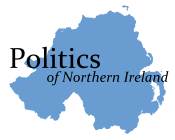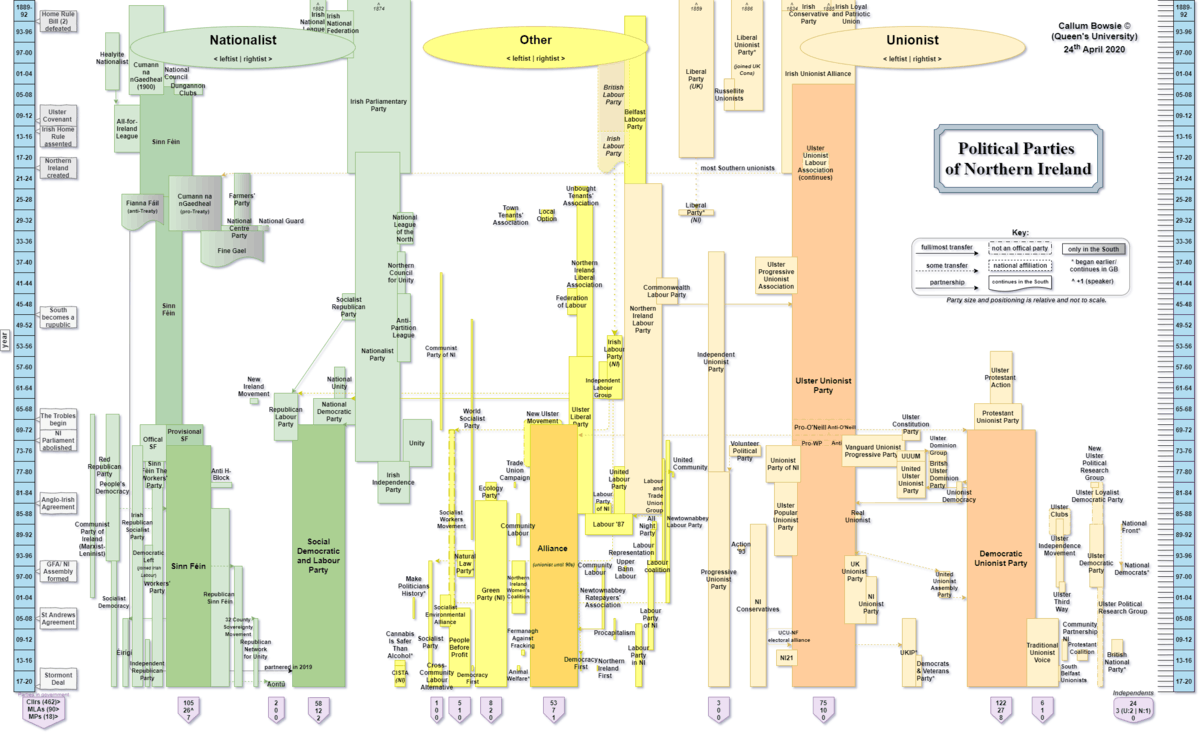List of political parties in Northern Ireland
Political parties in Northern Ireland lists political parties in Northern Ireland. The Northern Ireland Assembly is elected by single transferable vote and the composition of the Northern Ireland Executive is by power sharing determined by the D'Hondt system, among the members elected to the Assembly. Party affiliation is generally based on religious and ethnic background.
 |
|---|
| This article is part of a series on the politics and government of Northern Ireland |
a Lowercase "d" per here. |
|
Northern Ireland in the UK
|
|
|
Although Northern Ireland is a part of the United Kingdom, it has a quite distinct party system from the rest of the country, as the Labour Party and Liberal Democrats do not contest elections there (though the Liberal Democrats have links with the Alliance Party), and the Conservative Party has received only limited support in recent elections.
Some parties, such as Sinn Féin and the Workers' Party, are organised on an all-Ireland basis. Others such as the Conservative Party are organised on an all-United Kingdom basis. There are many Northern Ireland-specific parties and these, on the whole, predominate.
The distinction between "unionist/loyalist", "nationalist/republican" and "other" is not always easy with some parties and individuals. Some have defined themselves less by their position on the "Border Question" than on other political issues.
For example, the former Republican Labour Party/Social Democratic and Labour Party MP Gerry Fitt's career suggests he was first and foremost a socialist rather than a nationalist and he eventually left the SDLP claiming it had drifted from its founding intentions. Similarly the Workers' Party has its roots in the republican Official IRA but nowadays is considered to be a non-violent socialist and nationalist party. Several parties strive to be avowedly non-sectarian and would not consider themselves to be either unionist or nationalist. The Northern Ireland Assembly requires MLAs to designate themselves either "Unionist", "Nationalist" or "Other." This is a designation that is particularly resented by those who designate as "Other", as they have no input on who becomes First or Deputy First Minister.
There are some who see the terms "Unionist" and "Nationalist"/"Republican" as being of more relevance to the community that the party seeks to represent rather than the position on the border question. Several of the "Other" parties strive to be non-sectarian but have a clear position on the border.
Political parties with elected representation at a local, national, UK or European level
Party details
- The current party known as Sinn Féin broke from the party then known as Sinn Féin in 1970 and was initially commonly referred to as Provisional Sinn Féin.
- For the first twenty eight years of its existence, the Green Party did not have a national leader. Steven Agnew was elected as the first national leader in 2011.
Party representation
| Party | Representation (as of December 2019) | ||||||
|---|---|---|---|---|---|---|---|
| UK Parliament | Assembly | Local councils | |||||
| House of Commons | House of Lords | ||||||
| Democratic Unionist Party | 8 | 4 | 28 | 122 | |||
| Sinn Féin | 7 | 0 | 27 | 105 | |||
| Social Democratic and Labour Party | 2 | 0[nb 1] | 12 | 59 | |||
| Ulster Unionist Party | 0 | 2 | 10 | 75 | |||
| Alliance Party of Northern Ireland | 1 | 0[nb 2] | 8 | 53 | |||
| Green Party in Northern Ireland | 0 | 0 | 2 | 8 | |||
| People Before Profit | 0 | 0 | 1 | 5 | |||
| Traditional Unionist Voice | 0 | 0 | 1 | 6 | |||
| Progressive Unionist Party | 0 | 0 | 0 | 3 | |||
| Aontú | 0 | 0 | 0 | 1 | |||
| Cross-Community Labour Alternative | 0 | 0 | 0 | 1 | |||
- Margaret Ritchie, leader of the SDLP from 2010–11, has sat in the Lords since 2019, resigning from the party to do so.
- Lord Alderdice, leader of the Alliance from 1987–98, has sat in the Lords since 1996, taking the Lib Dem whip.
Other registered parties
Unionist and loyalist
Nationalist and republican
- Communist Party of Ireland (CPI)
- Éirígí - Registered to contest local elections only
- Fianna Fáil (FF) - Registered, but has not yet contested elections
- Irish Republican Socialist Party (IRSP) - Registered to contest local elections only
- Republican Network for Unity (RNU) - Registered, but has not yet contested elections
Others
- Labour Party in Northern Ireland - The British Labour Party have a policy not to stand in Northern Ireland. Until recently it was not possible for residents to even join the party; however this was changed on legal advice. The Labour Party has recently set up an officially recognised branch party in the region. The SDLP MPs unofficially take the Labour whip.
- Northern Ireland Liberal Democrats - The Liberal Democrats currently have a policy not to stand in Northern Ireland but to support their sister party, the Alliance, with many holding membership of both, and Alliance peers take the Liberal Democrat whip.
- Official Monster Raving Loony Party - Registered, but has not yet contested elections
- Socialist Party
- Socialist Workers Party
- Veritas - Registered, but has not yet contested elections
- Workers' Party of Ireland
Unregistered parties
Candidates for unregistered parties may choose either to be listed as "Non-Party", or to leave the section blank on the ballot paper, in the same manner as independent candidates.
- 32 County Sovereignty Movement - Does not contest elections, operates as a pressure group
- Republican Sinn Féin (RSF)
- Respect Party
- National Party
Inactive parties
Unionist and loyalist
- British Ulster Dominion Party
- Commonwealth Labour Party
- Independent Unionist Association
- Labour Unionist Party
- NI21
- Northern Ireland Unionist Party - deregistered 2008
- Protestant Coalition
- Protestant Unionist Party (evolved into the DUP)
- Ulster Constitution Party
- Ulster Democratic Party
- Ulster Loyalist Democratic Party
- Ulster Popular Unionist Party
- Ulster Progressive Unionist Association
- Ulster Protestant League
- Ulster Resistance
- Ulster Unionist Labour Association
- Unionist Party of Northern Ireland
- United Kingdom Unionist Party - deregistered 2008
- United Ulster Unionist Council
- United Ulster Unionist Party
- United Unionist Coalition (UUC)
- Vanguard Progressive Unionist Party
- Volunteer Political Party
Nationalist and Republican
- All Ireland Anti-Partition League
- Federation of Labour
- Fianna Uladh
- Irish Anti-Partition League
- Independent Socialist Party
- Irish Independence Party
- National Democratic Party
- National Democrats
- National League of the North
- National Unity
- Nationalist Party
- Northern Council for Unity
- Official Sinn Féin (now Workers' Party of Ireland)
- People's Democracy
- Red Republican Party
- Republican Congress
- Republican Labour Party
- Saor Éire
- Socialist Republican Party
- Unity
Communist
Others
- Belfast Labour Party
- Ulster Christian Democratic Party
- Commonwealth Labour Party
- Communist Party of Ireland (Marxist-Leninist)
- Communist Party of Northern Ireland
- Irish Labour Party (contests elections in the Republic)
- Labour coalition
- Labour Party of Northern Ireland
- Northern Ireland Labour Party
- Northern Ireland Women's Coalition
- Newtownabbey Labour Party
- Newtownabbey Ratepayers Association
- Natural Law Party
- Social Democratic Party - The post-1988 rump of the party stood in a Northern Ireland by-election in 1990; the party as a whole existed and was more prominent in Great Britain from 1981 to 1988 although the post-1990 rump group still exists.
- Ulster Independence Movement
- Ulster Liberal Party
- Ulster Movement for Self-Determination
- United Labour Party (Northern Ireland)
- Ulster Third Way - deregistered 2005
- Vote for Yourself Party - disbanded April 2009, de-registered 8 June 2009
Flowchart of all political parties in Northern Ireland

Party leaders
Party leaders serving 10 years or more are
See also
References
- Sources
- Nordsieck, Wolfram. "Parties and Elections in Europe". www.parties-and-elections.eu. Retrieved 11 July 2015.
- Marcus, Ruth. "Gender aside, the fall of Irish politician Iris Robinson is the same old sex scandal", Washington Post, 14 January 2010
- Taggart, Paul; Szczerbiak, Aleks. "The Party Politics of Euroscepticism in EU Member and Candidate States" (PDF). SEI Working Paper. 51. Sussex European Institute: 11. Archived from the original (PDF) on 10 December 2009. Cite journal requires
|journal=(help) - Ingle, Stephen (2008). The British Party System: An Introduction. Routledge. p. 156.
- "It will be ‘difficult’ for May to survive, says N Ireland’s DUP", By Vincent Boland & Robert Wright. Financial Times. 9 June 2017. Retrieved 10 June 2017.
- "Who Are The DUP? The Democratic Unionist Party Explained", LBC. 9 June 2017. Retrieved 10 June 2017.
- Anttiroiko, Ari-Veikko; Mälkiä, Matti (2007). Encyclopedia of Digital Government. Idea Group Inc (IGI). p. 394. ISBN 978-1-59140-790-4.
- "The Good Friday Agreement". SDLP. Retrieved 6 February 2014.
- Stephen Driver (2011). Understanding British Party Politics. Polity. p. 188. ISBN 978-0-7456-4078-5.
- Nordsieck, Wolfram. "Parties and Elections in Europe". www.parties-and-elections.eu.